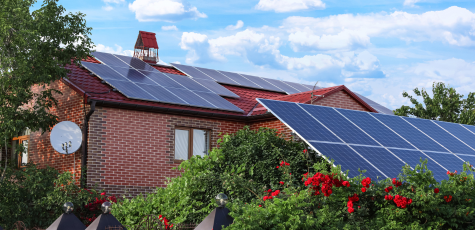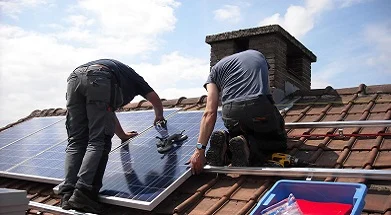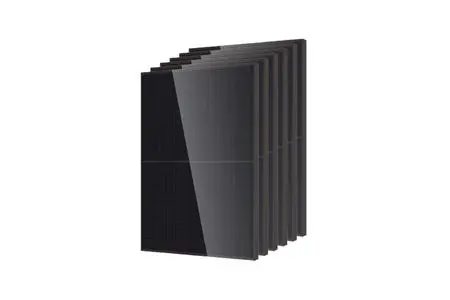When deciding to go solar, many UK homeowners will wonder if it's truly worth the investment. With the increasing popularity of solar energy as a sustainable and cost-effective alternative to traditional energy sources, it's important to weigh the pros and cons before making a decision.
So, should you go solar? Here at City Plumbing, we explore the benefits and considerations of installing solar panels on your home.
What Are The Benefits Of Going Solar?
Deciding whether to "go solar" as a homeowner is a significant decision with various factors to consider. Here's a breakdown to help you determine if it's the right choice for you in the UK:
- Reduced Electricity Bills: Once installed, sunlight is free, significantly lowering or even eliminating your reliance on grid electricity. This can lead to substantial savings on your energy bills.
- Earn Money from Exported Energy (Smart Export Guarantee - SEG): If your solar panels generate more electricity than you use, you can sell the surplus back to the National Grid through the Smart Export Guarantee (SEG) scheme.
- Lower Carbon Footprint: Solar power is a clean, renewable energy source, producing little to no harmful greenhouse gas emissions. This helps you contribute to environmental protection and the UK's net-zero goals.

- Increased Home Value: Homes with solar panels are often more attractive to eco-conscious buyers, potentially increasing your property's value and improving its EPC (Energy Performance Certificate) rating.
- Energy Security and Independence: Generating your own power reduces your reliance on the grid and fluctuating energy prices, providing greater energy security.
- Low Maintenance: Solar panels have no moving parts and generally require very little maintenance. Rain often helps to keep them clean.
- Long Lifespan: Most solar panels come with warranties of 25 years or more, and can continue to produce electricity for 30-40 years, albeit with a gradual decrease in efficiency.

What Are The Costs of Solar Panel Installation (UK)
The cost of solar panel installation in the UK varies depending on system size, panel efficiency, installer fees, and any additional components like batteries.
- A standard 4kWp domestic system typically costs around £6,500 - £8,900 (excluding VAT, which is currently 0% on solar panel installations).
- Including a solar battery can add an additional £2,500 - £4,000 to the total cost, but significantly increases your savings potential by allowing you to store excess energy.
- For a 3-bedroom house, a 4.5kW system with a battery might cost around £9,800.

Cost Breakdown (approximate percentages):
- Materials (panels, inverter, mounting kit, electrical equipment): 40-50%
- Business Costs (planning, scaffolding, transport): 30-40%
- Labour: 10-30%
Potential Savings and Return on Investment (ROI)
- Annual Savings: A 12-panel system with a battery could lead to annual savings of up to £1,229. For a 3-bedroom house, estimated annual savings with SEG and a battery are around £786.
- Payback Period: The time it takes to recoup your initial investment through energy savings and SEG payments. For a 3-bedroom house in the UK, the payback period is typically around 10-15 years.
- Long-term Profit: Over a 25-year lifespan, a 3-bedroom house could see a profit of £7,350 (including battery replacement).
- ROI: Estimated average return on investment for residential solar power systems in the UK ranges from 10% to 25% over the lifetime of the panels.
Grants and Incentives for Installing Solar Panels in the UK
While there aren't many universal "free solar panel" grants in the UK, several schemes can help reduce the cost:
- VAT Exemption: Currently, solar panels and batteries are VAT-free, saving you a significant amount.
- Smart Export Guarantee (SEG): This isn't a grant, but it's a guaranteed payment from energy suppliers for the excess electricity you export to the grid.
- ECO4 Scheme: This scheme primarily helps low-income households in England, Wales, and Scotland with an EPC rating of D or lower, potentially covering the full cost of installation.
- LA Flex Scheme: An extension of ECO4, for households with modest incomes or health conditions affected by cold, who might not receive other benefits.
- Home Energy Scotland Grant and Loan: Offers up to £7,500 for solar panel installation in Scotland.
- Nest Warm Home Programme: A Welsh government initiative offering free energy advice and potentially free home energy improvements, including solar panels, for eligible households.
- Home Upgrade Grant (HUG): For households in certain local authorities in England with a combined income under £39,000, living off the gas grid, and with an EPC rating between D and G.
It's crucial to check with your local council and the official government website for the most up-to-date eligibility criteria and available schemes.
Other Important Considerations Before Buying Solar Panels
- Location and Orientation: Solar panels perform best when facing south, but can still generate significant electricity on cloudy days. Shading from trees or buildings can negatively impact performance.
- Efficiency by Season: While summer offers the most sunshine, solar panels still work in winter, and colder temperatures can actually improve efficiency. The main factor in winter is fewer daylight hours.
- Maintenance: Generally low. Regular cleaning with lukewarm water (not hard tap water or harsh detergents) to remove dirt or debris, especially after dry periods. Professional servicing every 5-10 years is recommended to catch minor issues.
- Inverter Lifespan: Inverters typically need replacing every 10-15 years, which is an additional cost to factor in over the system's lifetime.
- Roof Suitability: Consider your roof's condition, size, and angle. Panels on flat roofs can be tilted for optimal energy production.
- Battery Storage: While optional, a solar battery significantly enhances savings by allowing you to store excess daytime energy for use at night or on cloudy days, further reducing reliance on the grid.

Should You Go Solar?
For many homeowners in the UK, going solar is a financially sound and environmentally responsible decision. It’s particularly beneficial if you:
- Have a suitable roof (south-facing, minimal shading)
- Have high electricity consumption
- Are looking for long-term savings on your energy bills
- Want to reduce your carbon footprint
- Are interested in increasing your home's value
- Are able to make the initial investment or qualify for grants
Before making a decision, it's highly recommended to get quotes from several MCS-accredited installers. They can assess your specific property, provide a tailored system design, and give you an accurate estimate of costs, potential savings, and payback period for your home.

Shop Solar PV at City Plumbing
The decision to go solar will largely depend on your individual circumstances and priorities. If you’re passionate about reducing your carbon footprint, saving money on energy bills, and gaining energy independence, solar energy may be the right choice for you. However, it's crucial to carefully consider the benefits and considerations outlined above before making a decision.
Here at City Plumbing, we offer an extensive solar PV range to help homeowners make the switch to renewable energy. Our entire solar PV selection is fully stocked with only the best high-quality products from some of the most revered industry-leading brands. From core components to inverters, mounting, units and accessories, our expert Renewables team at City Plumbing has got you covered.



